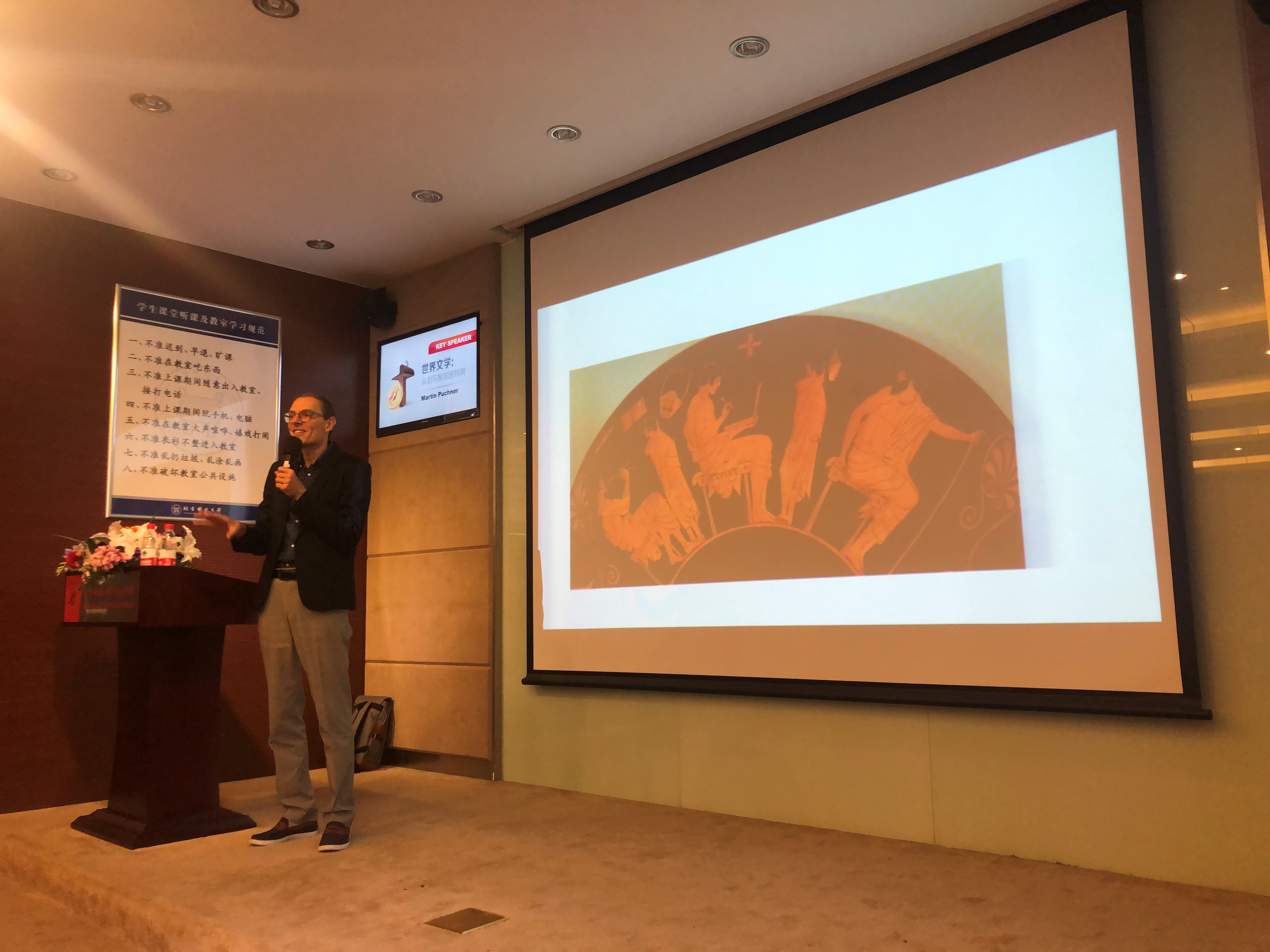World Literature: from Tablets to the Internet

From 9:45 a.m. to 12:00 a.m. on Sept. 12, Harvard Professor Martin Puchner gave a spiritual feast on world literature in Academic Hall of the SFS well-attended by teachers and students. In his lecture entitled “World Literature: From the tablet to the Internet” , Professor Puchner took the audience to the world literature through the core of his book, The Written World, focusing on the relationship between storytelling and writing techniques, including the invention of paper, parchment, and printing, and its impact on literature, and showed us the five stages of literature: the foundational epic, the sacred scriptures, the words of the Masters, up to the collection of stories and modern world literature.
Professor Puchner first led the students to the initial stage: the invention of writing and the epic. More than 5,000 years ago, Mesopotamia Civilization invented the word—as if it were embossed on clay, which gave birth to Sumerian. Sumerian was originally hieroglyph, but later developed into cuneiform for the convenience of writing. At that time, scribes used small wooden sticks or reeds to obliquely press some strokes on the clay slab to form words, and these clay slabs can be preserved for a long time after drying. This technique made the first written story “the epic of Gilgamesh” born and preserved.. The ancient Egyptians also used hieroglyph in the early days, and later they invented the alphabet. The alphabet was improved by the Phoenicia and passed on to Greece. After the Greeks improved the writing system, they recorded the great epic of Homer, the Iliad. Both of them were preserved by the invention of the written word, and influenced the world’s two great emperors, Ashurbanipal and Alexander, who changed and shaped the history and established mechanisms to preserve the two epics and influence future generations.
Next, professor Puchner led the students to the second stage: the scribe and the Hebrew Bible. Ezra the Scribe and other exiled scribes who devoted themselves to the transcription of the scriptures created the concept of Sacred Texts, and developed the Hebrew Bible from a classic rooted in land to a text that could also play a role in exile and thus be preserved. This new and modern writing system replaced the Hebrew alphabet with block letters borrowed from Aramaic and passed on for generations.

Then came the third stage: Literature of Master and Teacher. The four masters in different regions and eras, Buddha, Confucius, Socrates, and Jesus, did not use written language, but teach through dialogue and face-to-face conversation with students gathering around them, which was a striking similarity. After the death of the Master, their students usually recalled, arranged and wrote down the Master’s words, and formed a new literary: Master and Teacher’s Literature which revolutionized the world of ideas by shaping Indian philosophy, Chinese philosophy, Western philosophy, and Christianity.
The fourth stage came straight to the collection of stories and papermaking, and printing. By telling the story of the spread of the Tale of Genji, the world’s first novels, and the One Thousand and One Nights, and the Bible under Gutenberg and Luther’s improvements in papermaking and printing, professor Puchner showed us the importance of Chinese papermaking and printing.
The modern world of literature was pointed out in the fifth stage. Mechanical civilization, the technological foundation of modern world literature, has brought some worry to the literary world. Taking Don Quixote as an example, Professor Puchner put forward the concept of “pirate” in literature. In his opinion, as words spread around the world with a lower cost, literature became internationalized, but problems of originality, authority, and ownership followed under the booming printing industry. These issues are particularly worthy of reflection in the context of our current Internet world, but Professor Puchner remained optimistic about the impact of Internet technology on literature.
Finally, Professor Puchner concluded that the most striking feature of literature is the ability to pass down language beyond the limits of space and time.
With the similar actions of sitting before tablets and typing before computers, whatever the technonlogy, the only thing that keeps literature alive is its continued use. In other words, it is education, not technology, that support the future of literature.
In the end, Professor Puchner answered questions from the audience in detail. The lecture was ended with deafening applause.
